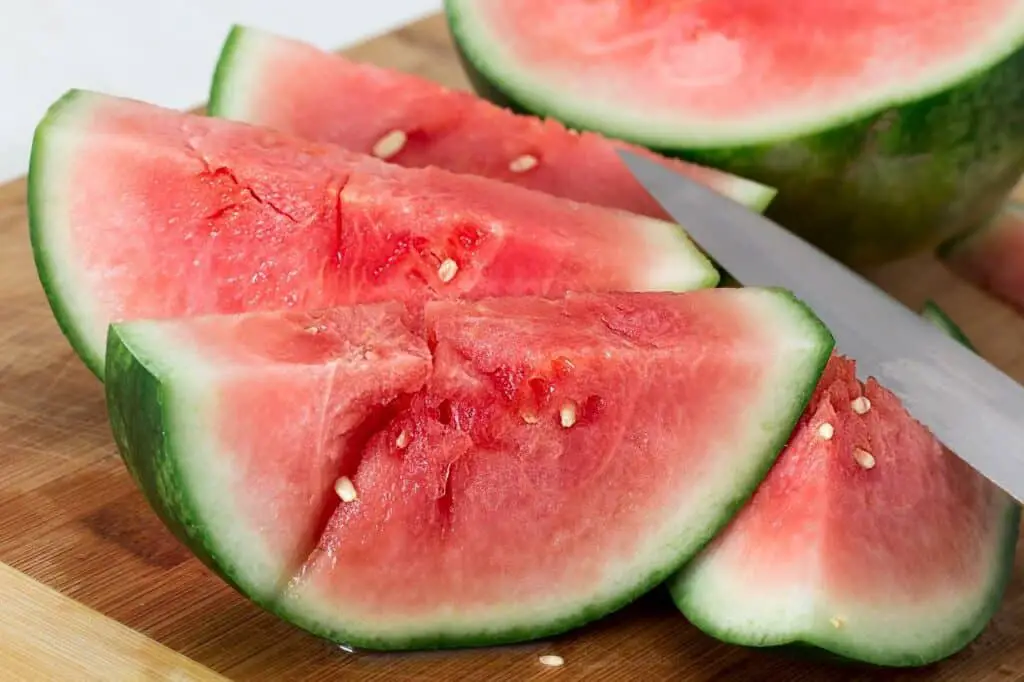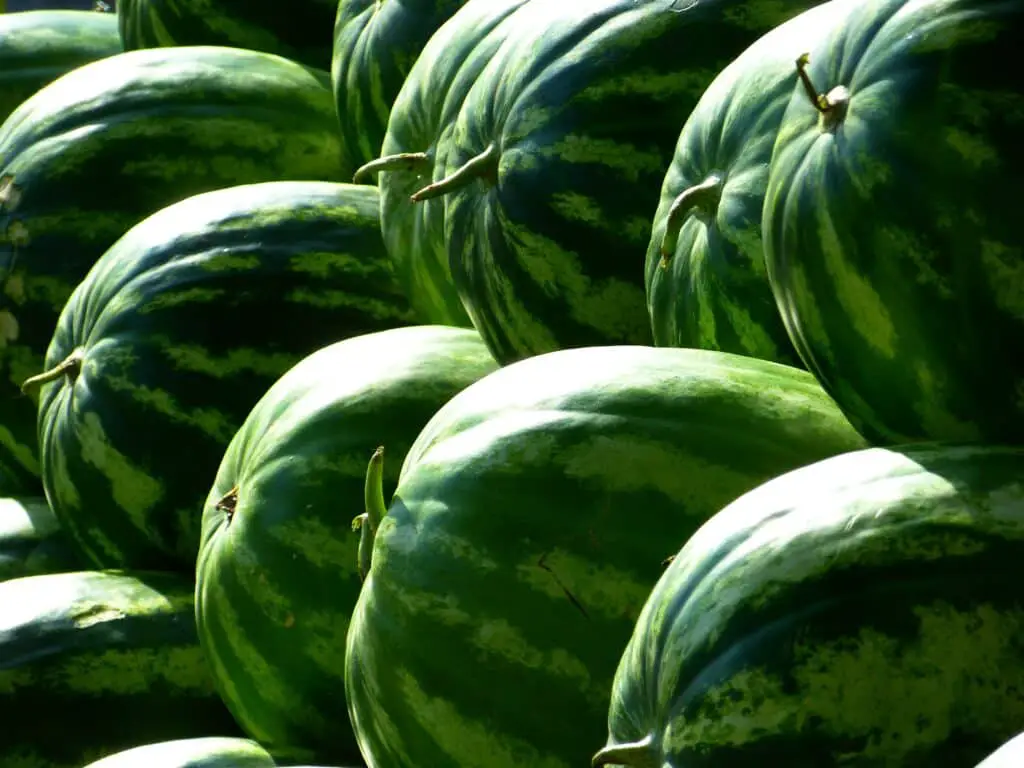Nothing beats the feeling of munching on a watermelon slice while basking in the sun with your furry best friend.
In this scenario, sharing this fruit with them can be tempting.
However, you may hesitate before doing so as you can’t be sure if it’s safe for dogs to have watermelons with white seeds or not.
So, can dogs eat watermelon with white seeds?
No.
Dogs should not have watermelon with white seeds because it could lead to gastrointestinal problems.
Watermelon white seeds are hard for these canines to digest and thus cause stomach upsets and intestinal blockage.
Herein is an explanation of what makes watermelon with white seeds unsafe for dogs.
This article also includes a description of removing white seeds from watermelons and a list of other fruits that may harm your pooch.

What makes watermelon with white seeds toxic to dogs?
Watermelons are not toxic to dogs, but their white seeds are challenging for your four-legged friend to digest.
Dogs don’t chew these seeds as they may hurt or even break their teeth in the worst scenarios.
Your pup will swallow them whole when ingesting the fruit and thus risk choking.
Moreover, these seeds sit in a dog’s digestive system without breaking down, which can be critical.
In this regard, contact the vet when your furry best friend ingests a lot of watermelon with white seeds.
What happens if my dog eats watermelon with white seeds?
You shouldn’t worry if your pooch accidentally eats a slice of watermelon with one or two white seeds as they won’t cause any health problems.
However, it’s risky for dogs to consume watermelons with many white seeds because they lead to intestinal blockage.
Intestinal blockage can happen in any section of a dog’s digestive tract, preventing water and food passage.
This then makes these canines weak as it reduces their blood flow.
Therefore, get your pup to the clinic immediately if you notice the following intestinal blockage symptoms.
- Constipation
- Diarrhea
- Abdominal pain
- Bloating
- Restlessness
- Vomiting
- Loss of appetite
- Dehydration
- Lethargy
In severe cases, your four-legged friend may require obstruction surgery to remove the white watermelon seeds causing their restlessness.

How to remove white seeds from a watermelon
A watermelon’s flesh is rich in essential nutrients for dogs, like vitamins A and C.
Below is a procedure for removing white seeds from watermelons so your pup doesn’t miss out on these fruits’ supplements.
- Cut the watermelon into wedges
- Locate the line of seeds on the watermelon wedge
- Cut a slice diagonally above the row of seeds on both sides of the wedge
- Cut along the bottom of the seed row on both sides
- Get rid of the flesh full of seeds
- Remove the rest of the seeds using the tip of a knife or spoon
Can my dog eat seedless watermelon?
Seedless watermelons are safe for these canines.
They contain several essential nutrients for dogs, and their benefits are described below:
- Water – About 92% of a seedless watermelon is water. This makes it the best treat for your four-legged friend on a sunny day.
- Vitamin C – These fruits are rich in vitamin C, which is a potent antioxidant and thus boosts dogs’ immune systems. This vitamin will also minimize your four-legged friend’s inflammation when ingested.
- Lycopene – Lycopene is the component that makes this fruit red. It promotes good vision and prevents cancer in dogs.
- Fiber – Fiber in watermelons eases food movement in your pup’s digestive tract, preventing constipation and diarrhea.
- Vitamin A – Aside from enhancing their coats, this vitamin promotes the proper functioning of dogs’ body organs like nerves, skin, and muscles.
- Antioxidants – Watermelons are rich in vital antioxidants for repairing damaged cells in dogs.
Can my dog have watermelon juice?
You can blend some watermelon cubes and make juice for your pup.
However, this fruit is full of sugars.
Thus, your pooch should not consume it in high amounts as it could lead to diabetes in dogs.
On the other hand, it’s not safe for dogs to consume store-bought watermelon juice.
This is because it may contain artificial colorings and preservatives that are harmful to these canines.

Can my dog eat watermelon rind?
Dogs should never consume watermelon rinds.
Although they are not toxic to dogs, your furry best friend may have difficulty chewing these rinds and thus swallow them whole.
This may cause your pooch to suffer from gastrointestinal blockage or obstruction, which requires surgery.
The watermelon rind is also challenging to digest hence worsening the situation.
It’s advisable to feed your canine the fleshy part of the fruit without seeds and throw away the rinds.
You should also never leave the rinds unattended, as your pet will most likely put them in their mouth without you noticing.
Other toxic fruits to dogs
Aside from watermelon with white seeds, below are other fruits that may harm your pooch if ingested.
- Avocados – This fruit has high amounts of fat which cause pancreatitis in dogs. It also leads to myocardial damage, vomiting, and diarrhea.
- Grapes – Dogs are unable to metabolize the monosaccharides and flavonoids in grapes. Thus, ingesting these fruits may make your furry best friend susceptible to kidney failure.
- Cherries – Cherries contain cyanide which causes dogs to suffer from muscle spasms, drooling, watery eyes, and vomiting.
Can my dog eat cantaloupe?
Cantaloupes are safe for dog consumption.
However, these fruits have higher amounts of sugar than watermelons; hence your pup should eat them moderately.
You should also avoid feeding your pup this fruit’s seeds and rind as they can lead to gastrointestinal blockage, which may be fatal for them.
Frequently asked questions (FAQs)
What will happen if my dog overeats watermelon?
Excess watermelon has laxative effects like diarrhea and bloating on dogs.
Although this fruit is packed with essential nutrients, your dog shouldn’t have it daily as they can also get these supplements from other foods.
Can my dog eat yellow watermelon?
Yellow watermelons are safe and healthy treats for dogs as long as you remove the seeds and rind before feeding them to your four-legged friend.
Can my puppy eat watermelon?
Watermelons are safe for puppies above six months of age.
It’s advisable to start with tiny amounts when introducing puppies to watermelons.
Can my dog have cucumbers?
Cucumbers are low in calories, sodium, and fat hence safe for these pups.
Dogs also enjoy these fruits’ crunch, making them a perfect replacement for other treats like bone biscuits, which may contain unsafe amounts of calories.
Conclusion
Dogs should not eat watermelons with white seeds as they may lead to gastrointestinal problems, which may require surgery.
Therefore, always remove the seeds before letting your pup indulge in this fruit.
- What Dog Breeds Have Pink Skin? - March 24, 2023
- What Are the Most Inspiring Dog Breeding Quotes? - March 20, 2023
- Can Pheromone Spray Help Improve Dog Breeding Results? - March 19, 2023








